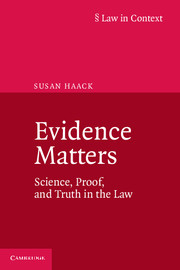Book contents
- Frontmatter
- Epigraph
- Contents
- Acknowledgments
- Introduction: A Pragmatist Perspective on Science, Proof, and Truth in the Law
- 1 Epistemology and the Law of Evidence
- 2 Epistemology Legalized
- 3 Legal Probabilism
- 4 Irreconcilable Differences? The Troubled Marriage of Science and Law
- 5 Trial and Error
- 6 Federal Philosophy of Science
- 7 Peer Review and Publication
- 8 What’s Wrong with Litigation-Driven Science?
- 9 Proving Causation
- 10 Correlation and Causation
- 11 Risky Business
- 12 Nothing Fancy
- Cases Cited
- Statutes, etc., Cited
- Bibliography
- Glossary
- Index
6 - Federal Philosophy of Science
A Deconstruction–and a Reconstruction
Published online by Cambridge University Press: 05 August 2014
- Frontmatter
- Epigraph
- Contents
- Acknowledgments
- Introduction: A Pragmatist Perspective on Science, Proof, and Truth in the Law
- 1 Epistemology and the Law of Evidence
- 2 Epistemology Legalized
- 3 Legal Probabilism
- 4 Irreconcilable Differences? The Troubled Marriage of Science and Law
- 5 Trial and Error
- 6 Federal Philosophy of Science
- 7 Peer Review and Publication
- 8 What’s Wrong with Litigation-Driven Science?
- 9 Proving Causation
- 10 Correlation and Causation
- 11 Risky Business
- 12 Nothing Fancy
- Cases Cited
- Statutes, etc., Cited
- Bibliography
- Glossary
- Index
Summary
It seems to me that there is a good deal of ballyhoo about scientific method. I venture to think that the people who talk most about it are the people who do least about it…. No working scientist, when he plans an experiment in the laboratory, asks himself whether he is being properly scientific…. When the scientist ventures to criticize the work of his fellow scientist, he does not base his criticism on such glittering generalities as failure to follow the “scientific method,” but his criticism is specific…. The working scientist is always too much concerned with getting down to brass tacks to be willing to spend his time on generalities.
–Percy BridgmanA TANGLED TALE
With Daubert, Ronald Allen observed in an article published the following year, the Supreme Court had “replaced a judicial anachronism [Frye] by a philosophical one [Popper].” It’s a nice one-liner; and there’s an element of truth in it. For decades, Karl Popper was enormously influential in philosophy of science (though, interestingly, less so in the US than elsewhere), and much admired by some important scientists. But by the time Daubert came down the year before his death at the age of 93, he was no longer the major player he had once been. The English edition of his Logic of Scientific Discovery first appeared in 1959; and since that time numerous rivals to his falsificationist approach had found supporters: Thomas Kuhn’s picture of routine, “normal” science conducted under a ruling paradigm, and the overturning and replacement of an old paradigm by a new in periods of “revolutionary” science (1962); Imre Lakatos’s attempt to distinguish progressive from degenerating research programs (1970); Paul Feyerabend’s methodological anarchism (1978); and, more recently, the many and various styles of “science studies,” Bayesian and decision-theoretical currents in mainstream philosophy of science, etc., etc. Popper still has his devotedly loyal followers, though they are fewer than they once were.
- Type
- Chapter
- Information
- Evidence MattersScience, Proof, and Truth in the Law, pp. 122 - 155Publisher: Cambridge University PressPrint publication year: 2014



